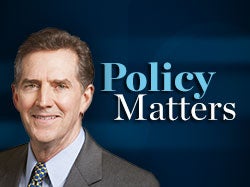An election is taking place in Central America in two weeks that will affect how safe we are here in our homes and on our streets. El Salvador may be about to turn into a gang haven that will act as a transit point for drugs plunging America’s inner cities further into crime and despair. And the whole mess can be laid at the White House’s door.
Such a development would not just directly harm our domestic tranquility.
If El Salvador becomes the hemisphere’s second narco-state and money-laundering machine after Venezuela, the secretary of homeland security would have no justification for continuing to extend Temporary Protected Status for many Salvadorans living in this country. And the secretary of the Treasury will have every reason to scrutinize possible illicit transactions the $4 billion in remittances that Salvadorans in this country send to their homeland.
The threat comes from the FMLN (the Farabundo Martí National Liberation Front), a former Marxist guerrilla group that turned into a political party in the 1990s. Its candidate, Salvador Sánchez Cerén, has admitted that as a guerrilla commander in the 1980s he participated in brutal slayings during a civil war that claimed 70,000 lives.
Sánchez Cerén, vice president today to the moderate Mauricio Funes, represents the hardline of the former guerrillas and by most projections is expected to win the presidency in the second-round elections on March 9.
Sánchez Cerén is no friend of the United States. He infamously celebrated al-Qaeda’s attack on us on 9/11 by leading a street mob that burned an American flag.
But it’s not abhorrence of his past acts that should lead us to pay heed, but concerns about his future actions.
If he takes El Salvador into the Venezuela-led and anti-American ALBA bloc, we could also see Hezbollah build the same presence in San Salvador it has in Caracas.
Most disturbing are the FMLN’s growing ties to the country’s ruthless street gangs, which are vertically integrated into dozens of U.S. cities, including some in Northern Virginia, just a few miles from the Capitol.
Documents that were disclosed in El Salvador recently reveal FMLN plans to incorporate the gangs into its electoral machinery.
These gangs are indebted to the FMLN, as the FMLN government secretly brokered a truce between the rival MS-13 and M-18. Documents exposed how, as part of this process, the government has offered jailed gang leaders cash payments, flat-screen TVs, prostitutes and even evenings out.
There’s little doubt that under Sánchez Cerén this impoverished neighbor of ours would become little more than a narco-principality.
Unfortunately, there are even more serious potential problems.
Sánchez Cerén’s confidante José Luis Merino is the party’s link to Colombia’s narcotrafficking, terrorist organization, the feared FARC.
Veteran Wall Street Journal journalist José de Cordoba put it this way: “The documents show that the FARC has an international support network stretching from Madrid to Mexico City, Buenos Aires to Bern. Merino, the documents suggest, is a key link in that international chain, the FARC’s man in El Salvador, and one of the architects of an arms deal that includes everything from sniper rifles to ground-to-air missiles.”
The Spanish newspaper ABC has even linked Merino to Italy’s Calabrese family, a member of which Merino dispatched to Venezuela to meet with the FARC.
I take no pleasure in saying I told you so, but I did play a key role in holding the appointment of President Obama’s ambassador to El Salvador, Mari Carmen Aponte, under whom our El Salvador policy has collapsed. Under Aponte’s watch, El Salvador has gone from ally to potential adversary.
Rather than request law-enforcement sanctions against the dangerous criminals, she has turned a blind eye and kept Washington uninformed. And to think that back in 2000 El Salvador was in the 11th freest countries in the Heritage Foundation/Wall Street Journal Index of Economic Freedom.
It is up to the Salvadorans to save their democracy.
However, a dose of truth-telling from their friends here will help them make an informed decision. That can only begin when responsible members of Congress haul in officials at the State Department and demand an explanation of who lost El Salvador.
Jim DeMint, a former senator from South Carolina, is president of The Heritage Foundation.
This piece originally appeared in the Miami Herald.
